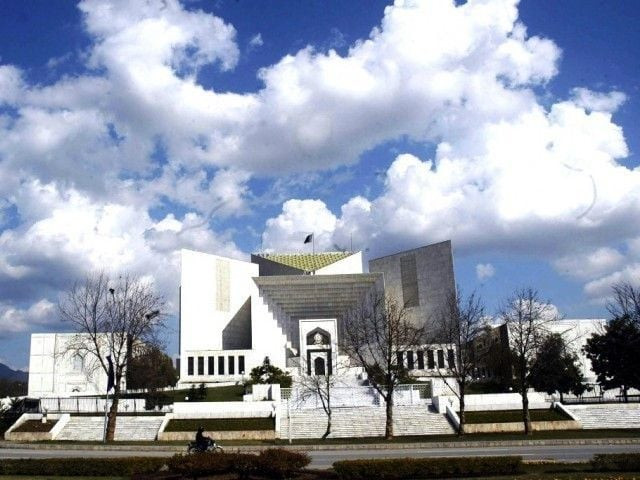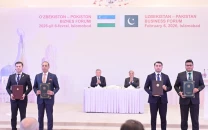Switching loyalties to change govt ‘a mockery of system’
SC takes strong exception to PM’s statement about ‘wooing judges’

The Supreme Court judges on Monday took strong exception to Prime Minister Imran Khan’s statement last week in which he alleged that Pakistan Muslim League-Nawaz (PMLN) leader Nawaz Sharif was trying to woo judges into going against the ruling Pakistan Tehreek-e-Insaf (PTI).
During the hearing of a presidential reference regarding the Article 63A of the Constitution, Justice Mazhar Alam Miankhel noted that observations and questions by the judges during the hearing had an impact outside the court.
Sitting on the bench, Justice Jamal Khan Mandokhail wondered whether the prime minister should restrain from giving such statements, saying that it seemed as if the prime minister had no confidence in the superior judiciary and the National Assembly members had no confidence in the prime minister.
Attorney General for Pakistan (AGP) Khalid Jawed Khan continued his arguments before the five-judge bench led by Chief Justice Umar Ata Bandial. He said that the judges should not be influenced by the happenings outside the court. Chief Justice Bandial said that they were not influenced by the statements given by political leaders.
During the hearing, Justice Ijazul Ahsan stated that there was no positive meaning of the word “defection” in the dictionary. He said that if lawmakers defected on account of incentives, there might be consequences under Article (62)(1)(f) of the Constitution.
Justice Mandokhail wondered what the need for the presidential reference was, saying that the Election Commission of Pakistan (ECP) should take the decision in case of defection. He asked the AGP if there was any shortcoming in Article 63A.
The AGP replied that Article 63A could not be read in singularity, stressing that those who were winning on a party ticket were bound by party discipline. He said that if a lawmaker could not get along with the party, he could resign. “Anyone who votes against party policy should be disqualified for life,” he contended.
Justice Ahsan asked the AGP about linking Article 63A to the Article 62(1)(f) – which is about the qualification of the elected representative—asking that was it not necessary to prove taking bribe at any forum. He asked as to whom the defecting lawmaker would be betraying.
Read: Showdown on no-confidence motion begins
The AGP contended in his reply that breach of Article 63A was legally tantamount to dishonesty, adding that Article 62(1)(f) would apply to that dishonesty. He said that defection would be betrayal to the people of the constituency, because the vote, once cast, could not be taken back.
The chief justice told the AGP that he wanted the court to determine the period of disqualification but Article 63A stated that membership would be terminated in case of defection. The chief justice said that Article 62(1)(f) required a court decision.
Justice Mandokhail pointed out that the process had been specified in the law – the party chief will give the declaration and then let the ECP decide after which the Supreme Court would see to the matter. He asked the AGP what if someone really responded to the call of conscience.
The AGP replied that there was no question about the procedure in the reference, stressing that the question was about the period of disqualification and the counting of votes.
Justice Miankhel asked on what basis the period of disqualification would be determined.
Justice Miankhel said that the whole procedure was given in Article 63A.
The AGP said that Article 63A was neutral regarding the period of disqualification, adding that the current political situation was also the reason for the reference.
Justice Ahsan said that violation of Article 63A could have a direct impact on the system, adding that if 10 to 15 members defect, it would be a “mockery of the system”. He said that it would become a musical chair if 15 people change the government and then go for re-election.
Read: SC orders arrest of people involved in Sindh House attack
Justice Ahsan asked the AGP to convince the court that defection would endanger the system and it was a serious crime. The AGP replied that Article 63A was meant to save the system. He mentioned that the Supreme Court had declared that horse-trading was a cancer.
Justice Mandokhail said that if one member benefited the other party, how the system would get compromised.
Justice Muneeb Akhtar said that the real issue was the stability of the political system.
The chief justice said that democracy was a good system but some things were very complicated.
Justice Mandokhail asked if all the parties wanted lifelong disqualification under Article 63A. “Why not parliament decides the period of disqualification,” he asked. The AGP said that parliament had done its job and now the court had to interpret it.
The chief justice said that if the no-confidence motion was successful, both the defecting members and the prime minister would go home. But if the defecting ruling party members resigned, the government would lose majority and in that case, the prime minister would have to take a vote of confidence.
The attorney general said that the people could express their views only through voting, adding that the Constitution disqualified members, who committed crimes, for five years. However, he added if the decision had been left to the people, then five-year disqualification would not have been included.
To a court query, the AGP said that he would require one to two more hearings to complete his arguments. However, the chief justice told him to try to complete his arguments by Tuesday (today), so that other lawyers would also be given time.
During the hearing, Sindh Advocate General Salman Talibuddin stated that the Islamabad police had not incorporated terrorism clauses in the First Information Report (FIR) lodged against those PTI workers who had attacked the Sindh House.
However, the chief justice asked the Sindh advocate general to approach the appropriate forum. Later, the chief justice told the Islamabad advocate general that the police should act in accordance with the law and submit a report on Tuesday (today).


















COMMENTS
Comments are moderated and generally will be posted if they are on-topic and not abusive.
For more information, please see our Comments FAQ